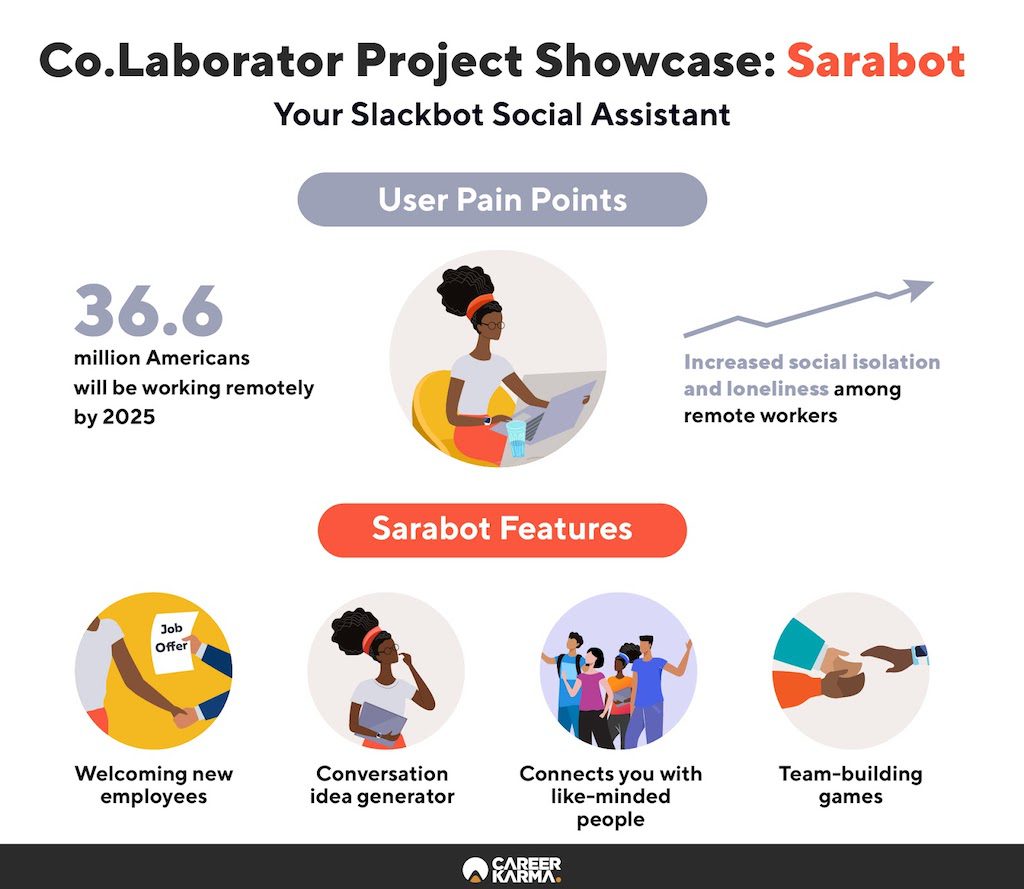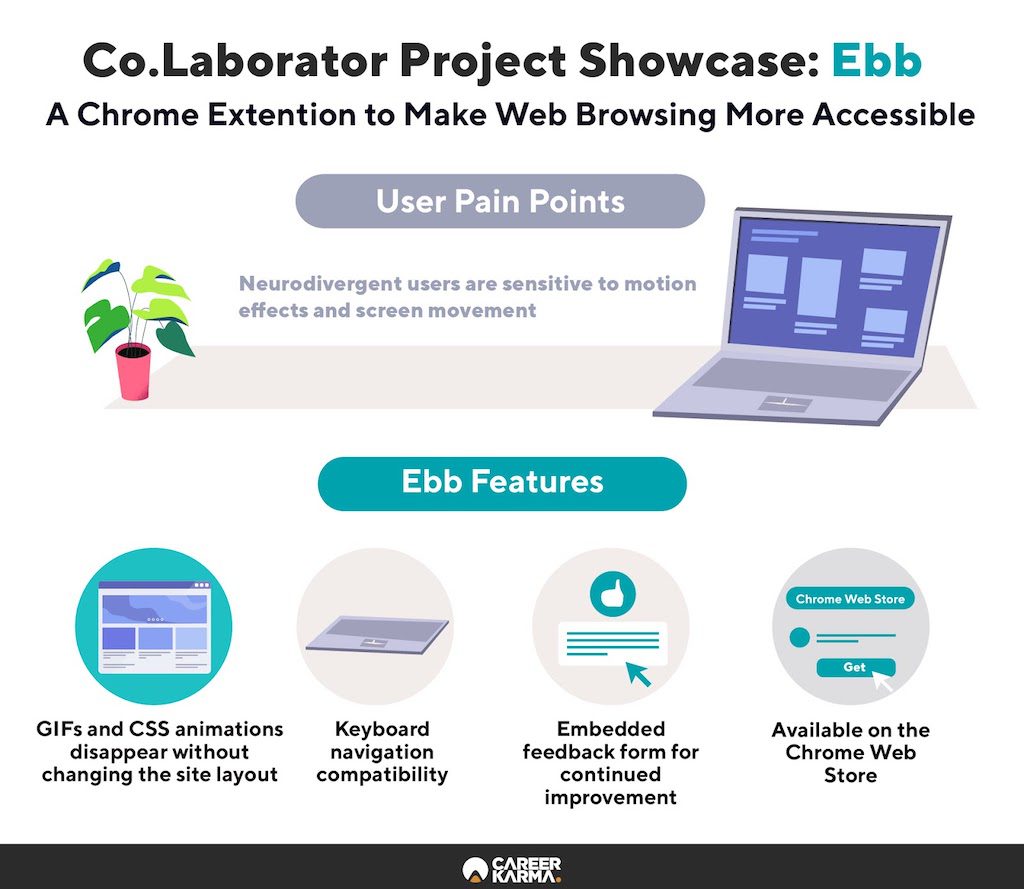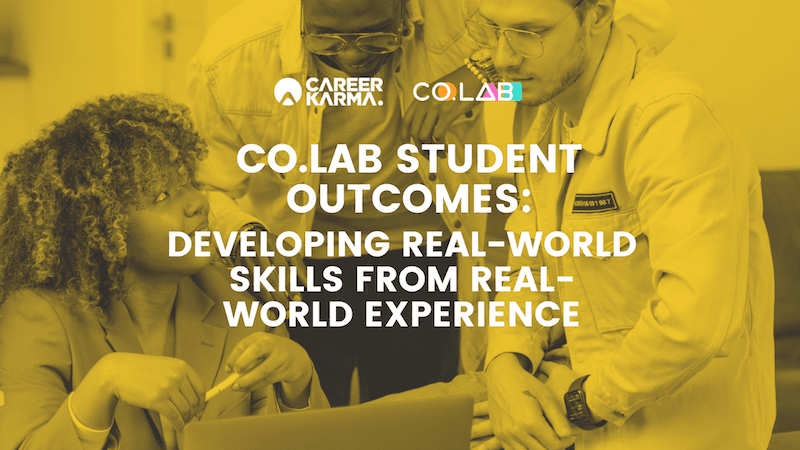Co.Lab is an eight-week remote tech bootcamp that seeks to provide its students with the practical experience and skills they need to transform their careers and move into tech. Co.Lab is designed with three program tracks: Product Design, Product Management, and Software Development, with prices ranging between $200 to $1,500.
The coding bootcamp was founded by Helen Huang and Sefunmi Osinaike, who both have experience in leading engineering teams. It was this experience that led them to create and foster their own space that drives a clear message to all students—past, present, and prospective: “You Belong in Tech.”
Co.Lab is a portfolio-building platform for junior designers, PMs, and developers to collaborate and launch real-world projects.
Apply to Co.Lab today.Who Is an Ideal Co.Laborator?
If you’re beginning to imagine yourself as a Co.Lab student, you might be on the right track. Being a Co.Laborator (that’s how students at Co.Lab are called) is a deeply transformative experience for students who are open-minded to the possibility of finding new paths and committed to putting in large amounts of work, especially during the design and development stages of team projects.
Students who attend Co.Lab graduate with an edge against the typical bootcamp grad. The key differentiator? Their preparedness for the competitiveness of the job market and the fast pace of the workplace.
Co.Lab’s Tangible Outcomes: Student Projects
Co.Lab’s primary goal is implicit in its name: for students to put their heads together and launch projects with longevity and tangibility. This is evident, for example, in Co.Lab’s Product Design Track, where students spend eight weeks researching with fellow Co.Laborators and mentors.
They then go on to explore multiple product testing routes and eventually work with developers to launch their products. Co.Lab’s outcomes come largely from these student-led, student-designed projects.
Indeed, the school’s project-based atmosphere is at the heart of the Co.Lab experience, which seeks to help students create job-ready portfolios of responsive, lively projects. As Co.Laborators build their projects and fill their portfolios with their experiences, they gain the hard and soft skills necessary to supply their future careers in tech.
Co.Lab’s unique approach to career preparedness is due, in part, to the school’s vast diversity in its student body. This allows students to work on projects they otherwise may not have considered tapping into before. As students work across disciplines, they gain not only knowledge of multiple areas but the real experience they’ll need under their belt when applying for their first jobs out of bootcamp.
Co.Lab seeks to remedy the fact that when students attend bootcamps, they end up in the workplace realizing that teams work across various disciplines, not just contained to one specific area of expertise. In terms of the numbers, Co.Lab reports that over 300 students have worked on building more than 60 functional, cross-disciplinary team projects. Of these projects, quite a few have continued to be developed into full products.
Let’s take a look at a handful of Co.Lab student projects to see what students are coming up with and how their work addresses issues, hurdles, and applicable techniques that may crop up once they set foot in the workplace.

Sarabot: A Lesson in Collaborating
Sarabot was created by a group of four Co.Laborators, under the mentorship of Elise Clement. The members are project manager Christine Medina, designer Liwam Beraki, and developers Estefani Baughman and Sara Paranuk.
Sarabot is a Slackbot that aims to alleviate the contemporary issue of remote workplace loneliness by engaging Slack channel members in coffee corner discussion—something that the virtual workplace doesn’t organically have.
Of this project, project manager Christine Medina says that she learned “what it’s like to work in a high-functioning team where trust is at its core.” Developer Estefefani Baughman adds that building a Slackbot such as Sarabot was “a big learning curve,” as members of the team had never done so before.
For Estefani, collaboration was one of the main drivers of the project’s success. Her team, she says, was helpful and “willing to share and listen” to get the project done.
Indeed, Co.Lab and its projects are all about community collaboration. It’s all about holding one another accountable for their parts of the work and removing the sense of competition so that their work can be at its most optimal.
When creating Sarabot, developer Sara says that she learned that the team “can create an amazing product if we listen to each other and work together.”

Ebb: Community Beyond Co.Lab
Ebb is a Chrome extension that reduces moving site components, like GIFs and CSS animations, to make web browsing more inclusive and accessible for neurodivergent users. That means users whose brain function and behavioral traits are different from what is usual, such as users with autism, ADHD, and dyslexia.
Ebb was created for a wide outreach of people who wish to experience the Internet in a less stressful, less triggering way. One of the most unique takeaways from Co.Lab is, as aforementioned, its long-lasting impact on its students.
Team Ebb says that their experience with Co.Lab allowed them to continue their journey with the product beyond bootcamp. They note, “While Co.Lab has officially ended, our product journey hasn’t. Given the positive reception of Ebb so far, the whole team has decided to stay together and keep working on Ebb! Our ultimate vision is to Ebb a one-stop solution for accessibility controls.”
Paths After Co.Lab
As aforementioned, Co.Lab students work closely with developers and mentors whose own experiences are shaped by their bootcamp experiences and knowledge of working with large companies. Co.Lab mentors come from notable companies such as Riot Games, Netflix, Amazon, Microsoft, Ecobee, and many more.
Co.Lab alumni go on to work as product designers and managers, comfortable with the knowledge they’ve acquired during their training. Some alumni even go on to share this knowledge with others, choosing to become mentors themselves.
Co.Lab alum Saeed Malakhail says that “traditional bootcamp is fine,” but that Co.Lab is home to “like-minded individuals.” He further describes Co.Lab as an experience that “mimics the real-world experience” through its team-based learning setup that includes all of the most important personnel on a project team: developers, designers, and managers.
Now that Saeed has completed Co.Lab and has been able to bring out his new resume to potential employers, he has landed a job as an intermediate software engineer at TWG in downtown Toronto.
Co.Lab Alum Spotlight: Alexander Calia
One of the major features of Co.Lab is its awareness that students are always seeking to upskill. Co.Lab alum Alexander Calia worked eight years in IT until he realized that it was time for a change.
So, he entered the coding bootcamp world, hoping for a quick path to a tech career. But after finishing the bootcamp, Alexander faced a job search process fraught with difficulty in reaching potential employers and pique their interest with his skills and portfolio.
“But I knew that I couldn’t give up. I was committed. I quit my job, I know that I don’t want to go back to IT. I spent the time and money so I’m not just going to give it up and just go back to what I was doing. I knew it was just a matter of the right place, right time,” says Alexander.
Soon after, he found Co.Lab.
During his time at Co.Lab, Alexander and his team worked on developing a project he felt dedicated to. It was something, he says, that he felt he could invest his career path in. The team created Community Fridges Toronto and moved it beyond just living on Instagram. In fact, they continue to work on it to this day.
“I was the sole developer on this project,” shares Alexander. “I was the one making the tech decisions, the one who came up with the technical solution in terms of materializing the idea and design into a tangible product. Just getting that experience and coming up with something tangible is a confidence booster, and it was definitely going to help me in the interview process.”
Because of his newfound confidence, the hiring manager at Air Miles took notice of Alexander and hired him as a web developer.
As far as advice goes for those trying to shift to a career in software development, Alexander says, “Be confident in yourself. Know that you can do this and show the interviewer that you’re passionate and that you really want to do this. Believe that you’re capable of figuring it out eventually because a big part of software development is really researching and learning on the job.”
Do You Want to Know More?
If you’re wanting more information about the Co.Lab experience, head on over to the official Co.Lab website to see what each of Co.Lab’s three program tracks have in store. To read perspectives from Co.Lab students and alumni, take a look at the official blog. While you’re at it, you may even consider applying.
About us: Career Karma is a platform designed to help job seekers find, research, and connect with job training programs to advance their careers. Learn about the CK publication.




